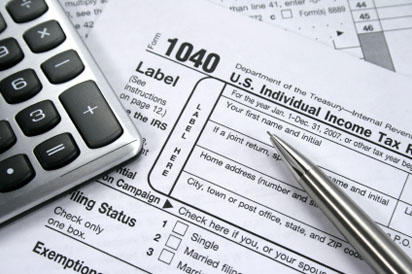Tax time can be stressful enough without worrying about whether your tax issues will spill over to your credit reports and affect your scores.
The good news is that simply filing an extension or finding that you owe the IRS a chunk of money come tax time shouldn't affect your credit reports. It's only when you don't have the money to pay what you owe that it can affect your credit.
Following are five ways that your yearly payment to Uncle Sam can affect your credit.
Going Into Hock to Pay Taxes
Many years ago, in my first year of self-employment, my accountant calculated my estimated taxes but forgot about the "self-employment tax" -- the portion of taxes that cover Medicare and Social Security. As a result, I learned on April 14 (!) that I owed a much bigger tax bill than I expected. At that time, there was no option to pay by credit card, and I didn't want to drain my savings entirely to pay it.
I ended up taking out a personal loan from my bank at a low interest rate and paid it off fairly quickly. It worked out OK. The loan, however, did appear on my credit reports. It didn't create any problems for me, but if you are going to borrow from another source such as credit cards or a personal loan to pay your taxes, keep in mind that debt can affect your credit scores. How much it will hurt (or help) your scores depends on everything else in your credit reports.
Keep it in perspective, though. After all, you may find it's better to owe a credit card issuer than to owe the IRS. Another option is to enter into an installment agreement with the IRS where you pay them monthly until your balance is paid off. In most cases, these payment plans don't appear on your credit. However, if you owe a large amount, you could wind up with a Notice of Federal Tax Lien filed against you, and that will definitely affect your credit. (More on that later.)
Quick Refund Woes
If you need your refund fast, you may be tempted to take advantage of a "refund anticipation loan." Often marketed as "instant" or "rapid" refunds, these short-term loans basically advance you your refund, usually at a very high cost. Whether or not this will show up on your credit reports depends on the lender's policies.
For example, H&R Block currently offers a Refund Anticipation Check, and its website states that this is a "bank deposit, not a loan." But it also offers a line of credit called the Emerald Advance and that does impact the taxpayer's credit. Their website says, "If you apply and qualify for an Emerald Advance, H&R Block Bank may report information about your account to credit bureaus. Late payments, missed payments, or other defaults on your account may be reflected in your credit report."
Also understand that if your refund takes longer than expected to arrive -- or doesn't come through at all -- you may wind up falling behind on this loan and that can end up on your credit reports. Don't think that won't happen to you. Tax-related identity theft is a large and growing problem I'll discuss in a moment. The New York Department of Consumer Affairs warns:
A RAL can damage your credit report ... If you're unable to repay the lender (usually a bank), the bank will report the unpaid debt to a credit agency which will negatively affect your credit report.
Tax Liens
If the amount of taxes you owe is large enough, or if you don't resolve your debt quickly with the IRS, you could find yourself with a tax lien on your credit reports. Tax liens fall in the "seriously negative" category with items like collection accounts or bankruptcy.
Fortunately, the IRS has become more lenient in its policies regarding tax liens in recent years. The threshold for automatically filing a lien has risen from $5,000 to $10,000. In addition, the IRS has a relatively new policy that allows taxpayers to request that lien be withdrawn once the debt has been paid in full. (After it has been withdrawn it can be removed from credit reports as well.)
And finally, taxpayers who owe $25,000 or less and enter into a direct debit installment agreement may be able to get the tax lien withdrawn after a few monthly payments have been made. If you do wind up with a tax lien on your credit reports, take the time to find out whether you can get it removed from your credit if you resolve the debt. If you're successful, your credit scores could rise significantly, provided the rest of the information in your reports is positive.
Going Bankrupt Because of Taxes
If you simply can't pay, tax debt can force you into bankruptcy. You may have to file to get rid of other debts so you can pay your taxes, or you may have to file to discharge some or all of your tax debt. Either way, the bankruptcy will be a serious setback for your credit and will remain on your reports for seven years if you file a Chapter 13 case or 10 years if you file under Chapter 7.
The reason you filed -- even if you believe the taxes were improper or unfair -- won't matter as far as your credit is concerned. All bankruptcies are treated the same when credit scores are calculated.
Identity Theft
If you file your tax return expecting a refund, but are told by the IRS that your refund has already been issued, you may discover that you are a victim of tax-related identity theft.
It's a problem that's expected to reach $21 billion during the next five years and the IRS is not doing a lot at this point to protect taxpayers. While the fact that you have been a victim of this type of fraud won't automatically affect your credit reports, you'll probably want to place a fraud alert or credit freeze on your credit reports. And that will make applying for credit or other services such as a cell phone, utilities or insurance, that much more of a hassle.
According to Identity Theft 911, it can take you up to a year to get your refund. So if you were counting on that money to pay off holiday debt, think again.
-- Credit.com's Personal Finance Expert, Gerri Detweiler focuses on financial legislation, budgeting, debt recovery and consumer savings information. She is also the co-author of Debt Collection Answers: How to Use Debt Collection Laws to Protect Your Rights, and Reduce Stress: Real-Life Solutions for Solving Your Credit Crisis as well as host of TalkCreditRadio.com. Have a question for our experts? Email them at CreditExperts@Credit.com.









